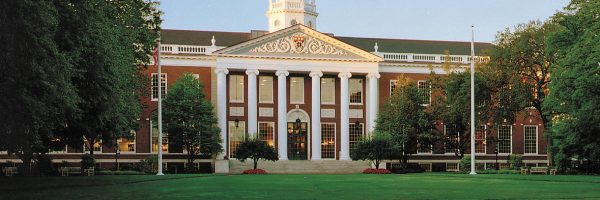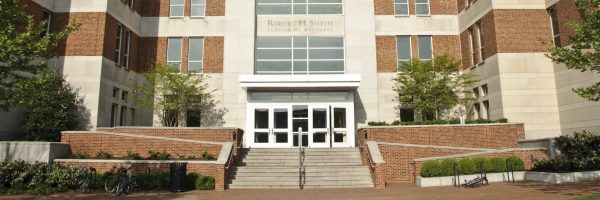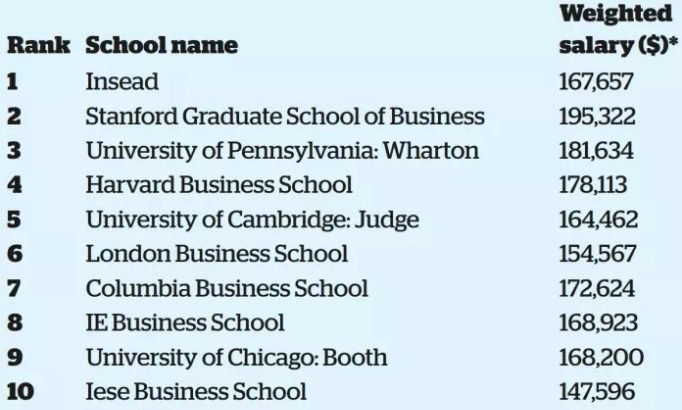Researchers at Columbia Business School Address MBA Gender Gap

Over the last few years, top business schools across the world have worked toward gender parity in their MBA programs—with considerable progress. Many MBA programs now admit more than 30 percent women, and a growing number of leading schools top the 40-percent mark. But amid these strides, another problem has emerged: an academic performance gap between male and female students. Recently, researchers at Columbia Business School (CBS) dug into the gender performance gap issue to understand why it happens and how to fix it.
After completing multiple empirical studies, including a survey of MBA students and a review of performance data, the researchers found that both students’ background and their behavior in class have the biggest impact on the gender performance gap. Further, the researchers found that the performance difference was most evident in technically focused classes, such as accounting and finance, and less so in socially oriented courses, such as leadership and marketing.
According to Michael Morris, CBS Leadership Professor and one of the study’s authors, the findings shed “new light” on the gender performance gap at top business schools. “But more importantly, they offer business school leaders directions for policies to effectively redress the grade gap,” he continued in a press release.
The researchers found that one of the main reasons behind the performance gap in technically oriented classes was the students’ background. After examining reported interests in both admissions applications and career counseling inventories, the researchers found that female students are more inclined toward the “poet” interest profile, while male students are more inclined toward the “quant.” For top MBA programs, this means that from the first day of class, male and female students come in with different interests, aptitudes, and experiences that will need to be addressed in order to break gender norms.
Gender norms were also a problem when it came to behavior in the MBA program. Researchers found that female students were typically less assertive, which hindered their learning in technical courses.
“Our research shows that female students far too often hold back and hesitate to ask the kinds of questions that would help them better master technical concepts and procedures, perhaps because it is inconsistent with the established gender norms linking men with technical ability. This has a profound effect on their overall achievement in MBA classes,” said author Aaron Wallen, Executive Director of the Management Division at Columbia’s School of Professional Studies and a former CBS lecturer.
To truly close the gender gap does not simply mean enrolling 50 percent female students, the researchers noted. Instead, top MBA programs also need to do the following three things:
- Sponsor programs that bring in more technically oriented female candidates.
- Conduct outreach to STEM undergraduate programs.
- Reduce required work experience to enroll younger students.
They also recommended including a training program for both faculty and students to teach them the skills for eliciting and managing participation in the classroom and other work settings.
To learn more about the research study—authored by CBS Professors Wallen, Morris, and Jackson G. Lu and INSEAD Professor Beth A. Devine—click here.
This article has been edited and republished with permissions from Clear Admit.
NYU Stern Launches New Tech and Fashion & Luxury MBAs

INSEAD, watch out. New York University Stern School of Business is getting into the one-year MBA game—and leveraging its New York City location in a major way. Stern announced yesterday that it will launch two new May-to-May MBA programs, one in tech and a second in fashion and luxury. In just 12 months, students in these programs will complete a foundational business core, a specialty area core, and electives. Along the way, they will work on real-life business projects for companies in tech or fashion and luxury respectively, gaining the experience and building the relationships that will land them jobs when they’re done.
Continue reading…
Which Business Schools Produce The Most Unicorn Founders?

Billion-dollar startups, more affectionately and repeatedly crowned as Unicorns, have become a benchmark that business schools around the world use to boast overall success. But which business schools actually produce the most successful startup founders?
New Leading Fearlessly Program Encourages Smith MBAs to Become Fearless Leaders

The development of leadership skills is heavily emphasized by many MBA programs. In fact, it’s often a selling point. At the University of Maryland Robert H. Smith School of Business, leadership development is a core part of the Smith MBA experience, which is why the school recently launched its new Leading Fearlessly Program. Continue reading…
Anxiety Persists for MBAs Despite Court Rebuke of Immigration Ban

Last week, a three-member panel of judges from the U.S. Court of Appeals for the Ninth Circuit refused the Trump administration’s call to reinstate a ban barring the entry of all refugees and visitors from seven predominantly Muslim countries into the United States. Although the case could still advance to the Supreme Court, yesterday’s ruling means that, for now, the executive order signed by President Donald Trump two weeks ago remains unenforceable.
That’s good news for international students from the affected countries, some of whom were detained at airports attempting to return to campus from overseas travel, others of whom were forced to cancel plans to leave the United States for fear they might not be allowed back in.
States Cite Harm to Higher Education as Major Reason for Opposing Ban
In affirming that the states of Washington and Minnesota had legal standing to bring the case against the immigration ban, the appellate judges specifically cited the ban’s injurious impact on the states’ public universities.
An excerpt from the ruling:
“Specifically, the States allege that the teaching and research missions of their universities are harmed by the Executive Order’s effect on their faculty and students who are nationals of the seven affected countries. These students and faculty cannot travel for research, academic collaboration, or for personal reasons, and their families abroad cannot visit. Some have been stranded outside the country, unable to return to the universities at all. The schools cannot consider attractive student candidates and cannot hire faculty from the seven affected countries, which they have done in the past.”
Citing the new court precedent, the judges argued that schools can assert the rights of their students. “The interests of the states’ universities here are aligned with the students. The students’ educational success is ‘inextricably bound up’ in the universities’ capacity to teach them,” the ruling says. “And the universities’ reputations depend on the success of their professors’ research.”
Of course, these concerns were not limited to public universities in the states of Washington and Minnesota. Indeed, as reported here, business schools around the nation were quick to decry the executive order on precisely those grounds. In the days immediately following Trump’s January 27 executive order, deans from Harvard Business School, UC Berkeley’s Haas School of Business, the University of Michigan’s Ross School of Business, the University of Pennsylvania’s Wharton School, NYU Stern School of Business and Columbia Business School, among others, spoke out strongly in opposition to the immigration ban while pledging to support their own affected students.
Global Business Education Is Best Antidote to Economic Nationalism, Say Business School Deans
Earlier this week, the Global Network for Advanced Management, a group of 29 international business schools committed to advancing innovation through global exchange, issued a statement in opposition to the current rise of populism, economic nationalism and anti-globalization rhetoric, noting that the global economy is more interconnected than ever before, making global exchange and engagement more important than ever.
Excerpt from the Global Network letter:
“As deans of Global Network member schools, we recognize that the fundamental drivers of global business are not changing. Technology will continue to advance and disrupt markets and societies, and the transfer of innovations and expertise across borders will continue. We believe that countries that retrench will harm themselves and their citizens. Therefore, we redouble our commitment to collaborative learning across countries and cultures, and to gain and leverage the insights of the best and brightest throughout the world. In this way, we continue to improve educational outcomes and professional development of our students, deliver innovations that benefit business and society, and contribute to a better world.”
This letter carried the signatures of deans from Haas, HEC Paris, INSEAD, Oxford’s Saïd Business School and Yale School of Management, among many others.
In the wake of the executive order, Haas Dean Richard Lyons received a letter signed by more than 1,000 Haas MBA students requesting that he reach out to deans of other business schools to speak out jointly against the executive order. He responded early last week to the Haas community that he had done just that.
Heightened Anxiety Persists
Despite yesterday’s ruling, business schools have encouraged their international students to exercise caution with regard to planned travel outside of the United States. “The temporary restraining order, which halted the enforcement of certain provisions of President Trump’s executive order banning foreign nationals from seven countries from entering the U.S., remains in effect after a decision by the 9th Circuit Court of Appeals,” read a notice posted today on the Harvard International Office (HIO) website. “Despite this ruling, the HIO continues to advise foreign nationals from the seven restricted countries (Iran, Iraq, Libya, Somalia, Sudan, Syria and Yemen) to exercise caution and discuss any travel plans with their HIO Advisor when considering travel outside the United States.”
This is because future court rulings could reinstate the ban, in which case foreign nationals from those countries most likely would not be admitted or readmitted to the country.
Next Year’s International Enrollment at U.S. Business Schools in Question
It remains to be seen what type of impact this uncertainty may have on international enrollment at U.S. business school’s next year. As of this writing, most business schools we reached reported that, thus far, international application volume had not been impacted.
“International application volume in Round 2 was identical to last year,” says Haas Assistant Dean of the full-time MBA Program and Admissions Peter Johnson. “Since our Round 2 deadline was in early January, it was after the election and before the recent executive order. If there is any direct impact from these events, it will likely be seen in the enrollment patterns of admitted international students, in our program and in other MBA programs across the country.”
Concern about the current administration’s policies and their impact on international students has been widespread. “The uncertainty and anxiety surrounding changes in visa and immigration regulations is affecting all international students, not only those from the countries included in the recent executive order,” says Johnson. “We have had questions ranging from ‘Will this impact my chances of admission?’ to ‘Will I be able to do an internship in the U.S.?’”
Johnson confirmed that Haas has no plans to alter its admissions process and will continue to offer spaces in its class to top candidates regardless of their country of origin. “We are committed to maintaining a diverse and inclusive environment, and international students and faculty are an important part of our community and the educational experience of all students,” he pledged.
HBS Managing Director of Admissions and Financial Aid Chad Losee made a similar pledge in a post to his Director’s Blog earlier this week. In it, he reaffirmed the school’s commitment to assembling a diverse class of leaders who will make a difference in the world, wherever they come from. “The recent U.S. executive order restricting travel to America for citizens from certain countries does not change this, nor are we changing our admissions policy or practices as a result,” he wrote.
This article has been edited and republished with permissions from Clear Admit.
INSEAD, Stanford Top Financial Times World MBA ‘17 Ranking

For the second year in a row, France and Singapore business school INSEAD topped the annual Financial Times‘ list of the world’s best full-time MBA programs. INSEAD was followed by the Stanford Graduate School of Business and The Wharton School at the University of Pennsylvania.
The methodology behind the construction of the Financial Times world full-time MBA list is simple:
The ranking is based on surveys of the business schools and their graduates of 2013. MBAs are assessed according to the career progression of alumni, the school’s idea generation and the diversity of students and faculty.
Meaning, that the list isn’t simply ordered by the annual average salary of those graduates surveyed, nor just isolating their individual approval of their time with the schools. For instance, despite being second on the list overall, Stanford GSB grads earned the highest average annual salary ($195,000). The reason INSEAD came ahead, despite a near $30,000 annual difference, was much higher rankings in the categories of value (11th overall) and international mobility.

For the first time in nine years Harvard Business School fell out of the top three while the London Business School fell to sixth, its lowest spot in 14 years. This also marks for the first time in the history of the ranking that LBS was not the first UK school on the list, supplanted by the University of Cambridge: Judge. As well, not listed in the top ten for the first time in 10 years—perhaps surprisingly—is the MIT Sloan School of Management.
Judge in particular may be the most outstanding winner of the ranking keeping in mind that just five years ago the school ranked 26th overall. Judge’s accolades stem from the tremendous value (1st overall). Tuition at the school is the cheapest among all selected in the top 15 and the opportunity cost was considered the 2nd best in the world.
Fifty-one U.S. schools managed a spot on the ranking (up from 47 in ‘16), including the Rutgers Business School, which was the highest new entrant at 70. The Mendoza College of Business at the University of Notre Dame saw the biggest increase from the previous year, moving up 16 spots to 60th overall (the school jumped 13 spots the previous year as well).
However, Canadian schools fell back slightly with only three making the top 100. The Rotman School of Management at the University of Toronto was the highest-ranking of the three at 65th.
Read the entire list and analysis here.
